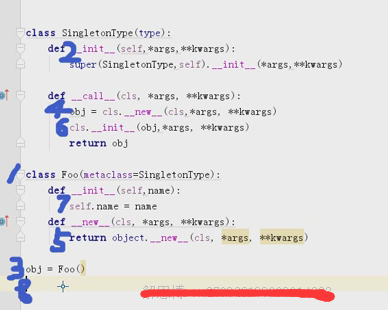前言:简单版:类加括号执行__init__()对象加括号执行__call__(),
全版:类是type创建的,创建类的时候type的__init__()方法自动执行,类加括号的时候执行type的__call__()方法
执行流程,
第零步 :编译一下类,将类加载到内存
执行type的__init__()方法,类是type的对象
第一步:执行type的__call__方法
调用创建的类的__new__方法,用于创建对象。
调用类的__init__方法,用于对对象初始化。
第二步:调用类的对象,即调用了类的call方法
执行流程


1 class SingletonType(type): 2 def __init__(self, *args, **kwargs): 3 super(SingletonType, self).__init__(*args, **kwargs) 4 5 def __call__(cls, *args, **kwargs): 6 obj = cls.__new__(cls, *args, **kwargs) 7 cls.__init__(obj, *args, **kwargs) # Foo.__init__(obj) 8 return obj 9 10 11 class Foo(metaclass=SingletonType): 12 def __init__(self, name): 13 self.name = name 14 15 def __new__(cls, *args, **kwargs): 16 return object.__new__(cls) 17 18 19 obj = Foo('name') 20 print(obj)
多线程

1 import threading 2 3 class SingletonType(type): 4 _instance_lock = threading.Lock() 5 def __call__(cls, *args, **kwargs): 6 if not hasattr(cls, "_instance"): 7 with SingletonType._instance_lock: 8 if not hasattr(cls, "_instance"): 9 cls._instance = super(SingletonType,cls).__call__(*args, **kwargs) 10 return cls._instance 11 12 class Foo(metaclass=SingletonType): 13 def __init__(self,name): 14 self.name = name 15 16 17 obj1 = Foo('name') 18 obj2 = Foo('name') 19 print(obj1,obj2)
单例模式三种

1 import time 2 import threading 3 class Singleton(object): 4 ''' 5 约定使用Singleton.instance()获取单例 6 ''' 7 _instance_lock = threading.Lock() 8 9 10 def __init__(self, *args, **kwargs): 11 time.sleep(1) 12 13 @classmethod 14 def instance(cls, *args, **kwargs): 15 if not hasattr(Singleton, "_instance"): 16 with Singleton._instance_lock: 17 if not hasattr(Singleton, "_instance"): 18 Singleton._instance = Singleton(*args, **kwargs) 19 return Singleton._instance 20 21 22 class Singleton1(object): 23 ''' 24 基于new实现单例 25 ''' 26 _instance_lock = threading.Lock() 27 28 def __init__(self, *args, **kwargs): 29 pass 30 31 32 def __new__(cls, *args, **kwargs): 33 if not hasattr(Singleton1, "_instance"): 34 with Singleton1._instance_lock: 35 if not hasattr(Singleton1, "_instance"): 36 Singleton1._instance = object.__new__(cls, *args, **kwargs) 37 return Singleton1._instance 38 39 # obj1 = Singleton1() 40 # obj2 = Singleton1() 41 # print(obj1,obj2) 42 43 44 class SingletonType(type): 45 ''' 46 基于mateclass实现单例 47 ''' 48 _instance_lock = threading.Lock() 49 def __call__(cls, *args, **kwargs): 50 if not hasattr(cls, "_instance"): 51 with SingletonType._instance_lock: 52 if not hasattr(cls, "_instance"): 53 cls._instance = super(SingletonType,cls).__call__(*args, **kwargs) 54 return cls._instance 55 56 class Foo(metaclass=SingletonType): 57 def __init__(self,name): 58 self.name = name
一. __init__()
__init__()是对象的构造方法
1 class Minal: 2 pass 3 4 print(type(Minal)) 5 print(Minal.__class__) 6 print(Minal.__class__.__bases__) 7 8 9 <class 'type'> 10 <class 'type'> 11 (<class 'object'>,)
二.__new__()
__new__(cls, *args, **kwargs)当创建对象时调用在init方法前调用,创建对象时调用,返回当前对象的一个实例;注意:这里的第一个参数是cls即class本身
三.__call__()
__call__(self, *args, **kwargs) 如果类实现了这个方法,相当于把这个类型的对象当作函数来使用,相当于 重载了括号运算符

1 先来看看如下示例代码: 2 #call.py 一个class被载入的情况下。 3 class Next: 4 List = [] 5 6 def __init__(self,low,high) : 7 for Num in range(low,high) : 8 self.List.append(Num ** 2) 9 10 def __call__(self,Nu): 11 return self.List[Nu] 12 13 如果 这样使用: 14 b = Next(1,7) 15 print b.List 16 print b(2) 17 18 那么回馈很正常: 19 [1, 4, 9, 16, 25, 36] 20 9 21 22 但如果这样使用: 23 b = Next 24 b(1,7) 25 print b.List 26 print b(2) 27 $python ./call.py 28 [1, 4, 9, 16, 25, 36] 29 30 Traceback (most recent call last): 31 File "cal.py", line 17, in <module> 32 print b(2) 33 TypeError: __init__() takes exactly 3 arguments (2 given) 34 35 __init__是初始化函数,在生成类的实例时执行。 36 而__call__是模拟()的调用,需要在实例上应用,因此这个实例自然是已经执行过__init__了。 37 你所举的后面那个例子: 38 b = Next 39 这并不是创建实例,而是将class赋给一个变量。因此后面使用b进行的操作都是对Next类的操作,那么其实就是: 40 Next(1,7) 41 print Next.List 42 print Next(2) 43 希望本文所述对大家的Python程序设计有所帮助。
来自于脚本之家,详细请看脚本之家
